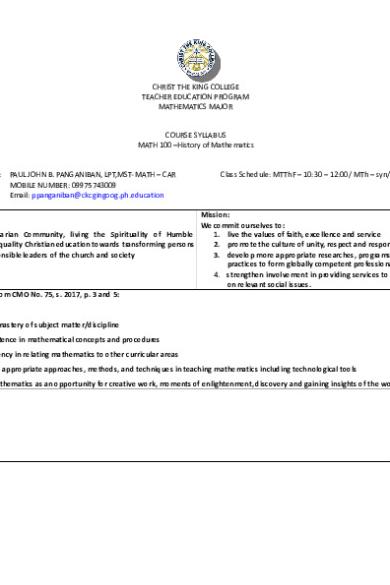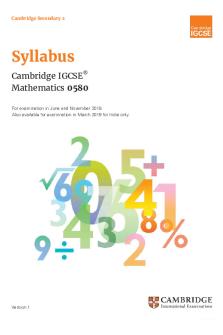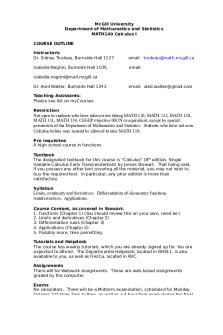Math 100: History of Mathematics Syllabus PDF

| Title | Math 100: History of Mathematics Syllabus |
|---|---|
| Author | Paul John Panganiban |
| Course | Education |
| Institution | Christ the King College |
| Pages | 6 |
| File Size | 267.1 KB |
| File Type | |
| Total Downloads | 68 |
| Total Views | 268 |
Summary
CHRIST THE KING COLLEGETEACHER EDUCATION PROGRAMMATHEMATICS MAJORCOURSE SYLLABUSMATH 100 –History of MathematicsINSTRUCTOR: PAUL JOHN B. PANGANIBAN, LPT,MST- MATH – CAR Class Schedule: MTThF – 10:30 – 12:00/ MTh – syn/TF - asyn MOBILE NUMBER: 09975743009 Email: [email protected]:We, th...
Description
CHRIST THE KING COLLEGE TEACHER EDUCATION PROGRAM MATHEMATICS MAJOR
COURSE SYLLABUS MATH 100 –History of Mathematics
INSTRUCTOR:
PAUL JOHN B. PANGANIBAN, LPT,MST- MATH – CAR MOBILE NUMBER: 09975743009 Email: [email protected]
Class Schedule: MTThF – 10:30 – 12:00/ MTh – syn/TF - asyn
Mission: We commit ourselves to: We, the Ignacian Marian Community, living the Spirituality of Humble 1. live the values of faith, excellence and service servanthood, provide quality Christian education towards transforming persons 2. promote the culture of unity, respect and responsibility: into humble and responsible leaders of the church and society 3. develop more appropriate researches, programs, strategies, and practices to form globally competent professionals; and 4. strengthen involvement in providing services to the poor and advocacy on relevant social issues. Program Outcomes (from CMO No. 75, s. 2017, p. 3 and 5: Vision:
Demonstrate mastery of subject matter/discipline Exhibit competence in mathematical concepts and procedures Exhibit proficiency in relating mathematics to other curricular areas Use effectively appropriate approaches, methods, and techniques in teaching mathematics including technological tools Appreciate mathematics as an opportunity for creative work, moments of enlightenment, discovery and gaining insights of the world
COURSE INFORMATION Course Code
Course Description
Math 100 Course Title History of Mathematics Pre-requisite None Credit unit 3 The course presents the humanistic aspects of mathematics which provides the historical context and timeline that led to the present understanding and applications of the different branches of mathematics Topics included in this course are not very technical and rigid aspects of mathematics; rather they are early, interesting, and light developments of the field. They are intended to enrich the background of the students in the hope that the students find value and inspiration in the historical approach to the mathematical concepts.
Course Outcomes
At the end of the course, the pre-service teachers should be able to: CO1. Demonstrate knowledge and understanding of the historical facts and landmarks that led to the development of the different branches and schools of thought in mathematics; CO2. Show critical and creative thinking in analyzing popular problems involving foundational concepts in mathematics; and CO3. Manifest appreciation for mathematics as a dynamic field through sharing of personal experiences of enlightenment relative to the evolution of the different branches of mathematics.
Time Allotment
Content
Week 1-3
Unit 1. The Development of mathematics: ancient period Origins of Mathematics:
Course Outcome (C0) CO1
Teaching and Learning Activities 1. Content Focus / Discussion 2. Online research work
Intended Learning Outcome (ILOs) At the end of the week, the preservice teacher (PST) should be able to: Discuss the development of mathematics in
Core Value Faith
4-Pronged Integration Scriptural Social Across Text Orientation Discipline Lk 7:50 Your faith has saved you; go in peace.
Manifest a strong sense and experience of God’s loving presence
Probabilit y and Statistics
Expected Output/Asse ssment Formative Assessment: 1. Pen and Paper quiz 2. Seatwork
Egypt and Babylonia
3. Book reports
Mathematics of Ancient Greece
Unit 2. The Development of mathematics: a historical overview: Medieval Period Medieval period and the Renaissance Birth of the Calculus Euler, Fermat and Descartes
developed through personal prayer and reflection
Show the evolution of numeration systems in ancient times
Islamic, Hindu and Chinese Mathematics
Week 4-6
the ancient period
3. Class participation
Recognize the symbols and notations used
CO1
1. Content Focus / Discussion 2. Online research work 3. Book reports
Perform the mathematical operations used in this period. At the end of the week, the preservice teacher (PST) should be able to: Discuss the development of mathematics in the medieval and renaissance period Discuss the birth of the calculus: Newton and Leibniz Identify the giants of mathematics in this period and
Service
Prov 11:3 The integrity of the upright guides them but the crookedn ess of the treachero us will destroy them.
Works beyond what is expected, freely and voluntarily
Algebra
Quiz Picture analysis
Week 7-10
Week 11-13
Unit 3. The Development of mathematics: a historical overview: Modern Period NonEuclidean Geometries Modern algebra and number theory c. Birth of set theory and problems in the foundations of mathematics
CO2
Unit 4. The Nature of
CO3
1. Content Focus / Discussion 2. Individual / Group Drill and Practice
discuss their contributions. At the end of the week, the preservice teacher (PST) should be able to:
Excellen ce
Discuss the origin of nonEuclidean geometries • Identify the 3. Library work personalities associated with 4. Book nonEuclidean reports geometries Present a timeline of these geometries from the time of their conception Examine the origins of modern algebra and number theory and set theory Identify the personalities associated with these branches of mathematics Discuss the problems in the foundations of mathematics 1. Content At the end of the week, Faith
2 Thess 2:15 So then, brothers, stand firm and hold to the traditions we thought you, whether by speech or by letter.
Works Physics with enthusias m and constancy for common welfare and social transforma tion
Formative Assessment: 1. Pen and Paper quiz
Lk 7:50
Shows love
Formative
Arts
2. Seatwork 3. Class participation
Focus / Discussion
Mathematics What is mathematics?
2. Individual / Group Drill and Practice
What do mathematicia ns do
3. Problem Solving
Is mathematics invented or created? Week 14-18
UNIT 5. Issues and Aspects The concepts and role of the proof Infallibility and certainty in mathematics Mathematics and technology: the role of computers
CO3
1. Content Focus / Discussion 2. Individual / Group Drill and Practice 3.Individual/G roup demonstration s
the preservice teacher (PST) should be able to: Discuss what is mathematics from a variety of points of view Discuss and describe what mathematicians do. Discuss and debate the origin of mathematics At the end of the week, the preservice teacher (PST) should be able to: Discuss the foundations and formalism of mathematics Discuss the relationship between mathematics and emergence of technology
Your faith has saved you; go in peace
for assiduous learning and research
Assessment: 1. Pen and Paper quiz 2. Seatwork 3. Class participation
Service
Humility
References Burton, D. M. (2010). The history of mathematics: An introduction (7th ed). McGraw-Hill Education Davis, P., Hersh, R., & Marchisotto, E. A. (2011). The mathematical experience. Springer Science & Business Media. Dunham, W. (1991). Journey through genius: The great theorems of mathematics. Wiley. Hodgkin, L. (2005). A history of mathematics: from Mesopotamia to modernity. Oxford University Press on Demand.
Accepts one’s giftedness and limitations with graciousn ess and sincerity
IT
Formative Assessment: 1. Pen and Paper quiz 2. Seatwork 3. Class participation
Katz, V. J. (2009). The History of Mathematics: An (3rd ed). Pearson Addison-Wesley.
Reviewed by:
Approved by:
Mr s . Ar l e n eA.Al v a r e z , MAED Pr o g r a mHe a d
S. MA. FELICISIMA L. CRUZ, RVM School President...
Similar Free PDFs

Art History 100 Syllabus
- 11 Pages

Mathematics - Math
- 1 Pages

Syllabus of Math 115
- 4 Pages

History OF Cricket 100 WORD
- 2 Pages

Math syllabus
- 40 Pages

Nrsg 100 math questions
- 7 Pages

Discrete Mathematics MATH 1061 Final
- 14 Pages

Math History Tech Task2
- 8 Pages

Math 171 Syllabus - syll
- 3 Pages

Math Standard Syllabus
- 96 Pages

Syllabus MATH 140
- 2 Pages

Math 111 F21 - Syllabus
- 7 Pages
Popular Institutions
- Tinajero National High School - Annex
- Politeknik Caltex Riau
- Yokohama City University
- SGT University
- University of Al-Qadisiyah
- Divine Word College of Vigan
- Techniek College Rotterdam
- Universidade de Santiago
- Universiti Teknologi MARA Cawangan Johor Kampus Pasir Gudang
- Poltekkes Kemenkes Yogyakarta
- Baguio City National High School
- Colegio san marcos
- preparatoria uno
- Centro de Bachillerato Tecnológico Industrial y de Servicios No. 107
- Dalian Maritime University
- Quang Trung Secondary School
- Colegio Tecnológico en Informática
- Corporación Regional de Educación Superior
- Grupo CEDVA
- Dar Al Uloom University
- Centro de Estudios Preuniversitarios de la Universidad Nacional de Ingeniería
- 上智大学
- Aakash International School, Nuna Majara
- San Felipe Neri Catholic School
- Kang Chiao International School - New Taipei City
- Misamis Occidental National High School
- Institución Educativa Escuela Normal Juan Ladrilleros
- Kolehiyo ng Pantukan
- Batanes State College
- Instituto Continental
- Sekolah Menengah Kejuruan Kesehatan Kaltara (Tarakan)
- Colegio de La Inmaculada Concepcion - Cebu



